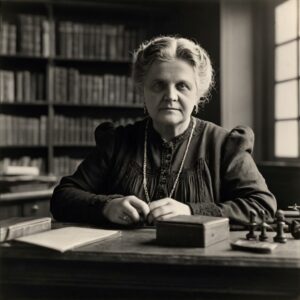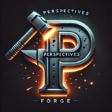At Perspectives Forge, we delve into the world of ideas that have shaped society and ask, “How can these lessons forge a better world today?” In the realm of education, one name shines brightly—Maria Montessori. Her pioneering work revolutionized how we think about children’s learning and development, and her impact on education continues to shape schools and teaching methods across the globe. Let’s explore how this remarkable woman forged a new perspective on early childhood education that has left a lasting legacy.

A New Perspective on Childhood Learning
Born in Italy in 1870, Maria Montessori defied societal norms by becoming one of the first female doctors in her country. But her greatest contributions didn’t come in the field of medicine—they came in education. Montessori observed that traditional methods of teaching, which relied heavily on rote memorization and strict discipline, were not effective in fostering a child’s true potential. Instead, she believed in a more child-centered approach that allowed children to explore and learn in an environment tailored to their natural development.
Her groundbreaking observation that children learn best through hands-on, self-directed activity led her to develop what we now call the Montessori method. This was a radical shift from the traditional, teacher-centered education system that was dominant in the early 20th century. Montessori created an environment where children could move freely, choose their activities, and learn at their own pace—an educational philosophy that recognized the individuality of each child.
Montessori’s Contribution to Education
At the core of Montessori’s method was a deep belief in the potential of children to be self-motivated learners. Her educational philosophy was built around several key principles:
Child-Centered Learning: Unlike traditional education, where the teacher is the central figure, Montessori believed that the child should be at the center of their own learning. Teachers in Montessori classrooms act more as guides, observing children and gently encouraging them, rather than controlling the learning process.
Prepared Environment: Montessori classrooms are carefully designed to allow children the freedom to explore. Every element, from the materials to the layout, is intended to foster independence, creativity, and natural curiosity. Children are free to choose activities that interest them, promoting self-directed learning.
Practical Life Skills: Montessori understood that learning extends beyond academics. She integrated activities that teach practical life skills—from pouring water and tying shoes to caring for plants. These tasks develop a child’s fine motor skills, concentration, and self-confidence.
Multi-Age Classrooms: Another unique feature of the Montessori method is the inclusion of multi-age classrooms, where children of different ages learn together. This promotes peer learning, with older students mentoring younger ones, creating a collaborative learning environment.
Intrinsic Motivation: Montessori emphasized the importance of nurturing a child’s intrinsic motivation. Instead of relying on external rewards like grades or praise, the Montessori method fosters a child’s inner drive to learn by making the learning process engaging and fulfilling on its own.
The Impact of Montessori’s Revolution
Maria Montessori’s approach to education has had a profound and lasting impact on educational practices worldwide. Today, more than 20,000 Montessori schools exist in over 110 countries, from Italy to India, the United States to Japan. Montessori schools are known for producing independent thinkers, creative problem-solvers, and lifelong learners.
Her influence extends beyond just Montessori schools, with many of her principles—such as child-centered learning, freedom of choice, and hands-on activities—being adopted into mainstream educational systems globally. Montessori’s focus on early childhood education is now a widely recognized cornerstone of child development, and her methods have influenced countless educators and schools.
Moreover, Montessori’s ideas about inclusive education were groundbreaking for her time. She worked extensively with children who had developmental disabilities, integrating them into the learning process rather than excluding them. This focus on inclusivity has carried through to modern approaches to special education.
A Legacy that Continues to Shape the Future
Montessori’s contribution to education cannot be overstated. She brought a new perspective to how children learn—one that respected their individuality, fostered creativity, and encouraged self-reliance. Her ideas continue to shape education systems across the globe, challenging conventional norms and offering a vision of schooling that is more humane, engaging, and empowering.
At Perspectives Forge, we believe that education is one of the most powerful tools for change. Maria Montessori’s revolutionary ideas remind us that forging a better future means rethinking how we educate our children. Her legacy challenges us to ask: What kind of education will forge the independent, thoughtful, and compassionate individuals our world needs today?
Forging Education for a Better Tomorrow
Maria Montessori’s vision was not just about teaching children to read and write; it was about nurturing curious minds, creative spirits, and responsible citizens. Her method is as much about character-building as it is about academic success. The Montessori method teaches us that children, when given the right environment and tools, can guide their own learning and growth.
As we look to the future, we must ask ourselves: How can we continue to forge education systems that respect the individuality of each child, encourage lifelong learning, and create the conditions for them to thrive? Maria Montessori provided us with a profound answer—one that will continue to shape the world of education for generations to come.
At Perspectives Forge, we believe in the power of new perspectives to drive meaningful change. Let’s continue to forge educational paths that inspire and uplift, just as Maria Montessori did.
